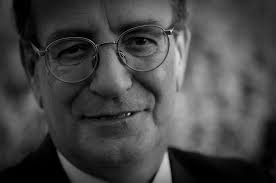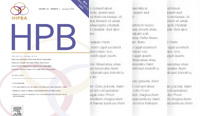International Hepato-Pancreato-Biliary Association
In memory of Claudio Bassi

Beloved. That is the word.
That is the consummate word to describe our friend, trailblazing leader, and inspiration, Claudio Bassi. The pouring out of emotion throughout the surgical community over the last few days for this man has been heartfelt and overwhelming. The IHPBA’s choice as a Living Legend (slated for next year’s congress in Cape Town) is, sadly, no longer in the world of the living. Claudio passed away peacefully among his loved-ones, including his devoted wife Teresa, last week at the age of 70.
Born in 1952, Professor Claudio Bassi was, save for attaining his MD degree in 1977 at the nearby University of Padua, a life-long denizen of Verona, Italy. He then matriculated back in Verona to obtain sequential certifications in General Surgery (1982) and Thoracic Surgery (1986). A brief clinical fellowship in transplant surgery ensued at the University of Munich. Then he settled in on faculty back at the University of Verona - becoming a full Professor and then assuming the Chair of the Unit of Pancreatic Surgery from his mentor and professional compass, the legendary Paolo Pederzoli. Claudio had the prescient vision to initiate the Verona Pancreas Institute, which would ultimately flourish as a national referral center and be respectfully referred to worldwide as the “Verona School” of pancreatic surgery.
Icons abound in today’s digitalized society, but they exist in more figurative than personified forms. It’s getting harder to appreciate just what affords one human iconic, or hero, status. Usually, it is a byproduct of a rich, broad commitment to a craft, honed over years of toil, with an ultimate concentration/expertise in a certain domain. Sprinkle in a dash of personality, and there you have an influential champion. To attain his lofty perch in our dominion, Claudio was not just a premier surgeon, but also a full-service pancreatologist - both clinically and scientifically. He attacked, head-on, two of the most wretched known diseases (pancreatic cancer and pancreatitis), and was a pioneer in understanding a third - the nascent and enigmatic IPMN. He authored more than 800 papers and his H-index at retirement was an astounding 121. Furthermore, he is author of more than 150 book chapters, and was the editor of 10 books. He was an invited speaker as a faculty member in more than 300 national and international meetings.
His seminal ISGPS paper defining pancreatic fistula (finally!), and its 2016 followup (both in SURGERY), have garnered over 7600 citations, with the original being recognized as the most influential pancreatic surgical paper of our era. Overall, his work has been cited over 82,000 times, mostly as the senior author of his scions at the Institute. These figures land Claudio as the 35th ranked Italian clinical scientist of all time (www.topitalianscientists.org), and afford him placement in the list of the world’s top-10 experts for pancreatic cancer by Expertscape. The development of subsequent generations of dedicated pancreatologists was his biggest professional point of pride.
Claudio’s professional accomplishments included being a Fellow of both the American College of Surgeons (FACS) and Royal College of Surgeons (FRCS), as well as an honorary member of the American Surgical Association (ASA), German Surgical Society, Hungarian Surgical Society and Hellenic Society for Digestive Surgery. Back at home, as a proud Italian, he served as President of the Italian Association for the Study of Pancreas (AISP) and Vice-President of the Italian Society of Surgery (SIC). In our realm of HPB surgery, we recall that he was steady at the helm of the European-African Hepato-Pancreato-Biliary Association (E-AHPBA, 2013-2015). He was a stalwart of The Pancreas Club, where he firmly established the Verona school’s footprint with seminal contributions – annually, for decades.
Stepping away from these professional accolades, Claudio was a big family man who knew how to enjoy life and its splendor. His greatest joy was his grandchildren. He was deeply in love with Teresa. They had a breathtaking get-away on nearby, scenic Lake Garda (who’s topography is ironically shaped like a pancreas), where they frequented a quaint trattoria. Many have also been privy to Claudio’s musical brilliance. He was a talented guitarist (of many genres) who composed his own music. A special treat was catching his performance at The Pancreas Club, where he unveiled his almost eponymous “Grade C Fistula Blues” along with Nick Zyromski. He played with soul.
My personal relationship with Claudio was unexpected and deeper than it might have been at face value - beginning when I visited his unit as the SSAT’s Josef Fisher Traveling Fellow in 2008. Before even any academic or surgical interaction occurred, Claudio and I instead strolled the gardens around GB Rossi hospital on a perfect, sun-bathed, Latin morning. Upon introduction, he immediately sensed my apprehension. You see, I had just flown overnight on the evening of November 4th, 2008. I was dismayed that, in that pre smart-phone era, I was not yet able to discover who had just been elected President of my country. The locals at my modest accommodation did not speak English, and a soccer match was all that was portrayed on the television at breakfast. It was Claudio who, somewhat astonished at my ignorance, informed me it was Barack Obama. We went in to a long and deep conversation where we shared our respective views on American politics and their impact on the world at large. Just two guys sharing our unique, and mutually informative, perceptions.
I was a relative nobody in our field, but Claudio assured that I was treated with the highest respect by his team, and he hosted a wonderful dinner for me and my wife, replete with gifts. There and then, we initiated our significant collaboration over a topic we were both passionate about – pancreatic fistula. It would be the beginning of a special relationship with Claudio, the “Papa Bear” and his progeny, some of whom he would entrust to me in later years to expose them to our perspectives at the “Filadelpie” outpost of the Verona school.
He was a shrewd administrator, who rose to the highest levels of local, national and international leadership. Yet he achieved by encouragement, rather than dominance. He respected the power he held and was careful not to abuse it. He nurtured. Emblematic of this was his critical value to the ISGPS – spawned by such strong personalities such as Markus Buchler, John Neoptolemos, Christos Dervenis, Jakob Izbicki, Charlie Yeo, Bill Traverso, and Mike Sarr. Claudio was the “glue-guy” who forged consensus amongst this highly acclaimed, and certainly opinionated, collection of pancreatic surgical leaders. The seminal contributions of that particular collective are one of his tangible legacies. The second is the family he created in his “unit”. He built upon the foundation of the Pederzoli tradition of excellence, and grew it further through both scientific and humanistic approaches. The stable of bright minds he first attracted, and then cultivated, has already left so many indelible impressions on our field, and (believe me) they are just getting started.
What I realized through the years about Claudio was his genuine humanity. He was the heart and soul of Verona, respected to the utmost by his colleagues, peers and pupils. The photo of Claudio accompanying this testimonial is my favorite. Composed in a rich, warm tone, you can sense the character behind the smile. It is welcoming. It oozes kindness.
Our colleagues in Verona have hearts full of sorrow right now. Reach out to them and share your stories about this beautiful man and kind soul we have lost. It will buoy them.
Charles Vollmer, on behalf of the IHPBA Executive Committee
Corporate Partners
If you are interested in becoming a Corporate Partner of the IHBPA please contact industry@ihpba.org
Find out more


